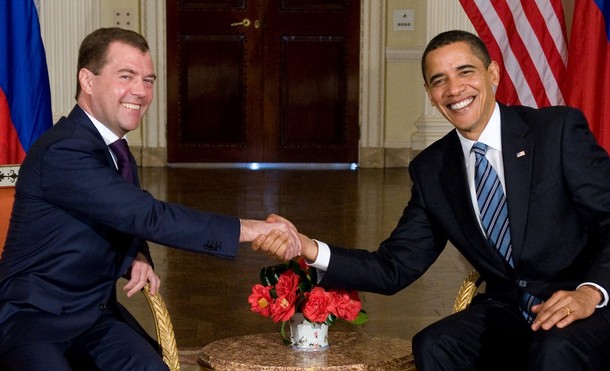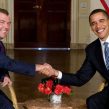
U.S.-Russia Moscow Summit Presents Last Opportunity to Avoid War in Georgia
Publication: Eurasia Daily Monitor Volume: 6 Issue: 122
By:

During the summit between presidents Barack Obama and Dmitry Medvedev in London on April 1, it was decided in the words of Obama, "to prepare by the end of this year a legally binding and sufficiently bold" new nuclear arms control agreement to replace the 1991 Strategic Arms Reduction Treaty (START), which expires in December. It was provisionally planned that during Obama’s visit to Moscow beginning on July 6, a framework agreement outlining a new START treaty will be endorsed (EDM, April 9).
Russian and American negotiating teams have been regularly meeting and reporting good progress in START talks. The commander of the Russian Strategic Rocket Forces Colonel-General Nikolai Solovtsov announced that by 2012 Russia may reduce its strategic nuclear arsenal to 1,700-2,000 warheads and could eventually go down to 1,500, "if there is a political decision" (Interfax, June 10). The reduction seems steep, compared to the 5,000-6,000 limit allowed by the 1991 START-1 treaty. Recently the U.S. has announced that it has already unilaterally cut its number of operationally deployed strategic warheads to 2,200, and Russia apparently has just over 3,000 operationally deployed, as its cold war built strategic arsenal declines.
The most optimistic statement about a possible U.S.-Russian breakthrough came this month from U.S. Defense Secretary Robert Gates, who was widely quoted in the Russian media as suggesting a possible joint deployment of an anti-Iranian Ballistic Missile Defense (BMD) shield in Europe with interceptors in Poland and radars in Russia. Gates was also quoted as saying that he had convinced former President and now Prime Minister Vladimir Putin that the missile threat from Iran is real, while Russian intelligence assessments to the contrary are erroneous (RIA Novosti, June 10). The Russian foreign ministry swiftly denied any change in official policy, stating that Russia does not believe that Iran posed any missile threat that could warrant the U.S. BMD in Europe, and that any possible "joint discussions" of a U.S.-Russian BMD collective project may begin only after Washington officially rejects any plans to deploy BMD in Europe (Interfax, June 11).
Last weekend, during a visit to the Netherlands, Medvedev issued an official statement about U.S.-Russian START negotiations "making a good start." Medvedev added, "Russia cannot agree with U.S. plans to deploy a global BMD" and that "a legal link between BMD and strategic nuclear weapons must be part of a new treaty" (www.kremlin.ru, June 20). This seemed to counter Washington’s insistence that the new START treaty must not include the controversial BMD issues. Obama’s administration seems to be ready to tacitly promise that the deployment of BMD in Poland and the Czech Republic might be delayed, while efforts to press Iran to curtail its nuclear and ballistic missile programs continue. But putting legal restraints on future U.S. BMD plans seems to be politically unacceptable (Moscow Times, June 11; Interfax, June 22). The Russian linkage of BMD and START in a new treaty could undermine the coming summit in Moscow (Kommersant, June 22).
There are other outstanding contentious issues. Kremlin-connected Russian political commentators have been stating, "an Obama visit to Moscow can only be successful if he publicly announces a 20-25 year moratorium on Georgia and Ukraine joining NATO" (RIA Novosti, June 20). In exchange for the recognition of Georgia and Ukraine being within Russia’s sphere of control, Moscow could offer Obama help in the transit of supplies to troops in Afghanistan. There have been reports that the U.S. might be allowed to continue to use the Manas airbase in Kyrgyzstan (Kommersant, June 16). Manas has been used by coalition forces to support operations in Afghanistan since 2001, but in February the Kyrgyz government announced its closure after receiving pledges of over $2 billion in aid from Moscow. This week the U.S. and the Kyrgyz authorities announced a deal that the Manas base will stay for at least another year under the name of a "transit center." The Russian foreign ministry is reported to have expressed its outrage over the reversal of the Kyrgyz decision, but some sources in Moscow still believe the Manas reversal could be part of a bigger covert Obama-Medvedev deal (Kommersant, June 24).
While the Obama visit is being prepared, Moscow is continuing military and propaganda preparations for a possible full-scale military invasion to change the present pro-Western regime of President Mikheil Saakashvili in Georgia. Senior Russian generals and diplomats have been accusing Georgia of preparing "a new aggression" (EDM, June 18). Last week a Georgian Lieutenant Alik Bzhania, 35, who served in the Georgian coast guard and apparently defected to Russian-controlled Abkhazia, was promoted by the Gazprom-owned liberal Ekho Moskvy radio. He was promptly given asylum and held a high profile press conference in Moscow. Bzhania announced, "Saakashvili is preparing an aggression and I do not want to fight Russia" (Interfax, June 19). A Moscow journalist that interviewed Bzhania, speaking on condition of anonymity, told Jamestown that the orders to publicize the defector came directly from Putin’s office. If Russia is planning full-scale military action in Georgia, it clearly needs an excuse that it is in self-defense – countering an alleged "Georgian aggression."
On June 29, Russian troops begin massive military exercises on Georgia’s borders as well as in occupied Abkhazia and South Ossetia – Kavkaz 2009 (EDM, June 18). The exercises are planned to end on July 6, when Obama lands in Moscow. The troops will be deployed and fully ready to go into action for at least several weeks after July 6, which apparently makes July the most dangerous month in the troubled South Caucasus. Obama’s visit to Moscow may be the last slim hope to avoid a war: if the U.S. president understands the threat and decides to put Georgia at the center of his negotiations instead of START -which is deadlocked anyway by the BMD linkage. It may be still possible to pull off a diplomatic miracle by pressing or persuading Putin to stand back.




